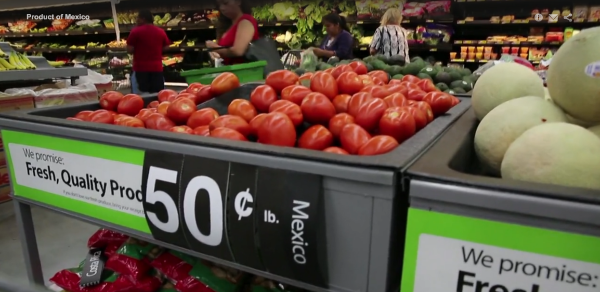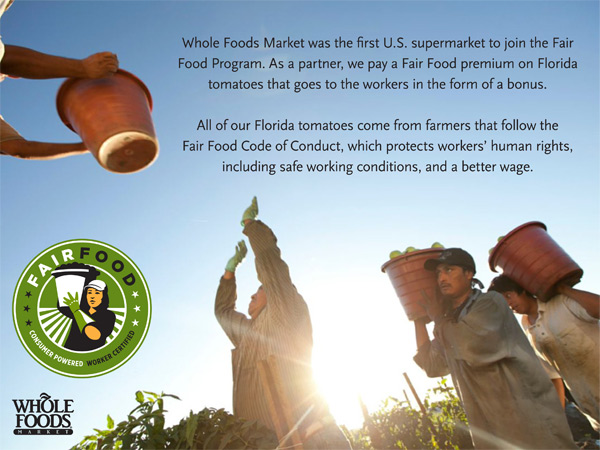[hupso title=”PART 3: A 21st century #Christmas Carol for the food industry?” url=”https://ciw-online.org/blog/2015/01/21st-cent-christmas-carol-3/”]
Business as usual is no longer an option for the US food industry in the face of outrageous human rights violations in Mexico’s produce industry;
Food industry leaders must leverage their unequaled purchasing power — reward ethical producers, reject those unwilling to implement real reforms — to raise the bar for human rights in Mexico.
Remembering that today is the eleventh day of Christmas (making this third and final series installment still timely)…
Before we conclude our three-part series on the LA Times investigation into labor rights violations in Mexico’s fields and its aftermath, a brief recap is in order. In Part One, we examined the LA Times’ findings and the “Perishable Pundit’s” disturbing response to the report. You can find Part One here. It was the Pundit’s callous editorial on the discovery of abject poverty, widespread debt servitude, violence against workers, and rampant child labor in Mexico’s produce industry that gave this series its Dickensian frame.
In Part Two, we began our discussion of how the 21st century food industry should respond to the revelation of 19th century labor conditions in its suppliers’ operations. We highlighted two essential elements of an adequate response:

- Face the problem head on: Mexico is a mess. Unconscionable exploitation in the produce industry is just the immediate problem. Unchecked political corruption and hyper drug violence – the twin pillars of what Mexican social critics have termed the country’s “culture of impunity” — are the backdrop against which everything else takes place in Mexico today. Until those deeper societal problems are addressed, any claims of social responsibility by major buyers of Mexican produce are at best unverifiable and, at worst, a hollow fiction. First and foremost, US retail food companies must be honest with their customers about the extent of the problem. Consumers will value transparency in the face of a difficult situation.
- Take no shortcuts: There are no easy fixes. Desperate to stem the public relations fallout from the LA Times series, Mexican growers last week announced the formation of an industry-led association to address the human rights crisis in their fields last week. US retail food companies would be wise not to let their suppliers’ desperation further stain their own brands’ reputations. The hastily-minted “International Fresh Produce Social Responsibility Alliance” will not root out labor abuse in Mexico’s fields, for any number of readily obvious reasons (it is, at bottom, a public relations initiative; workers play no role – much less a leading role – in its design or implementation; its enforcement mechanisms are at best cloudy and weak, etc.). Indeed, there are no shortcuts to real social responsibility, whether the industry in question is located here in the US or in a country where even the basic rule of law is in doubt as it is in Mexico today. US buyers of Mexican produce would be well-advised to steer clear of their suppliers’ damage control schemes or they will, sooner or later, be tarred with the inevitable failure of those schemes.
To summarize, we quote the Perishable Pundit himself, from the conclusion to his otherwise disappointing column on the LA Times series:
… transparency in the supply chain is increasingly going to be demanded, and this article is neither the first nor the last. The newspaper’s effort in putting together graphs showing the flow of produce is a game-changer. It is telling retailers from Whole Foods to Wal-Mart that you own your supply chain and you will be held responsible for all that occurs within it.
So what is a US retail food company that relies on Mexico for a significant portion of its produce purchases to do if it hopes to make any credible claims to social responsibility in its Mexican supply chain? How can US food industry leaders find their way out of the human rights nightmare portrayed in the LA Times series toward a happy ending to this 21st century Christmas Carol?
Use. Your. Market. Power.
US demand built the Mexican produce export industry; US demand can rebuild it, too, if the buyers are willing. It’s that simple.
Let’s take the Mexican tomato industry as an example. Following the historic liberalization of trade in the mid-1990’s between the US and Mexico with the passage of the North American Free Trade Act, the Mexican tomato industry quickly mushroomed into the colossus it is today. Less than ten years after NAFTA, Mexico was exporting nearly half of its entire tomato production, with 90% of those exports going to the US market. The invisible hand of the marketplace, in the form of US demand for cheap tomatoes, magically marshaled people, materials, capital, and political resources from across Mexican society into the production of tomatoes for export, and in two short decades conjured up an industry capable of meeting the very precise specifications of US consumers. Today, Mexican producers supply over 70% of the US import market for greenhouse tomatoes alone.

Greenhouse-grown. Vine-ripened. Perfect size and shape. Whatever the US consumer wanted, the US consumer got from an industry that, for all intents and purposes, barely even existed just twenty years ago. Billions of dollars in tomato purchases flowed south and a latter-day gold rush was on in Mexico’s fields.
The one thing the US consumer – or, better said, the US retail food giants that buy hundreds of millions of pounds of Mexican tomatoes a year and sell them to US consumers – didn’t demand of Mexican producers was ethical labor standards. And so, by omission, US consumers get cheap, delicious fresh tomatoes, made cheap by the outrageous exploitation of the workers who pick them.
But now, after years of abuses hidden in the shadows created by distance, cultural differences, and fear (both the workers’ fear to confront their employers and that of the media that might expose the labor abuses if not for the extreme violence that has captured tomato growing regions in Mexico like Sinaloa), the LA Times series has finally blown the lid off the deplorable labor conditions in Mexico’s fields, and US retail food companies have a decision to make.
Feigned ignorance of labor abuses in Mexico is no longer an option. Whatever buyers do now, they do it with full awareness of the horrific conditions in Mexico’s fields – and knowing full well that they have the power, if they choose to use it, to change those conditions.

A Three-Point Plan for Reforming Labor Practices in the Mexican Produce Industry
To buy or not to buy, that is the question (to switch great English authors for a moment).
Actually, that’s not exactly the question. Rather, the question facing the US food industry is how best to condition its purchases of Mexican tomatoes on respect for human rights so as to help modernize labor conditions there over time.
But however the question is phrased, the fate of Mexico’s farmworkers depends on the buyers’ answer. Here is how we would suggest buyers proceed.
[Before we share our thoughts, it should be said that, happily, we are not speaking from idle speculation or wishful thinking. Rather, our proposal is informed by the successful reform of the Florida tomato industry through the implementation of the Fair Food Program following generations of deplorable labor conditions fostered by entrenched economic interests and deeply rooted cultural practices. So, the experience here in Florida does provide some useful precedent, though it should go without saying that the reforms in Florida did not take place against a backdrop of rampant political corruption and drug violence.]

1. Short-term: Shift purchases immediately, to the extent feasible, to Florida. Clearly, given the degree of dependence of the US retail market today on Mexican imports, it is not possible to suspend all purchases from Mexico until conditions improve there. But a strong message must be sent, and that message must be unmistakable: The outrageous exploitation exposed in the LA Times series is not acceptable, and until real measures to protect fundamental human rights are in place there, business as usual is impossible. The only way to send that message credibly, in a way that growers will take it to heart, is by disrupting their sales. Given that the Florida tomato industry has undergone an unprecedented transformation over the past several seasons thanks to its participation in the Fair Food Program — from “ground zero for modern-day slavery” just a few years ago to what has been called “possibly the best working environment in American agriculture” on the front page of the New York Times this past year — the choice for where to shift those purchases couldn’t be clearer. Florida tomatoes today are simply better than those from Mexico, precisely because they do not carry the invisible poison of human rights abuse.Until human rights for farmworkers are a priority in Mexico as they are today in Florida, US food retailers must give Florida tomato growers an unequivocal preference. That much is a no-brainer.
2. Mid-term: Commission a study, under the leadership of credible Mexican and international non-governmental organizations, to identify growers within Mexico that currently demonstrate best labor practices there and reward those growers with increased purchases. Like the horrific labor conditions that came to light over the past several years in the textile factories of Bangladesh, the human rights crisis in Mexico’s fields is real and it requires a concerted international response. An extraordinary measure like an industry-wide study of labor practices — with unfettered access to workers in the fields, to company payrolls and administration, and to workers outside of the workplace in labor camps and in their communities — is a necessary first step to determining the best actors currently and the baseline from which the industry must progress. However, for obvious reasons, such a study cannot be undertaken by US retail food leaders themselves, much less by the Mexican produce industry. To be credible, it must be done under the leadership of respected Mexican human rights organizations, with the support of leading international human rights organizations able to act free of the pressures debilitating Mexico’s civil society today. US retail buyers of Mexican produce exports are uniquely placed, given their unequaled economic importance to the industry, to call for such a study and ensure that it is conducted honestly. The intensity of economic and political violence in Mexico and the fear that violence generates, combined with the relative scarcity of experienced, willing human rights organizations, pose formidable obstacles to the realization of a reliable study. But a thoroughgoing investigation of prevailing practices across the industry would be an invaluable assessment of the current landscape and guide to the long road ahead toward a more humane industry.
3. Long-term: Work with suppliers in Mexico over the coming years to foster sustainable ethical production practices that can withstand the pressures undermining social justice in the country as a whole. Over time, if the first two steps are implemented, conditions will improve in Mexico. Growers there, just as was the case with growers here in Florida, cannot afford to ignore multi-billion dollar retail food buyers when they send a clear, unflinching message through the market. As conditions improve, increased purchases should follow, flowing back to those producers in Mexico who make real, verifiable commitments to strict human rights standards.
These three steps, though clearly necessary and fair, will face resistance, and not just from the Mexican producers whose long-held practices they are intended to reform. Many buyers will argue that they are too dependent on Mexican tomatoes at this point to shift purchases. But that is wrong. If Mexican tomatoes were suddenly to fail to meet the other market specs truly important to those buyers — size, quality, variety, etc. — they would find other suppliers who do meet their demands and not hesitate for a moment to shift their purchases.
Mexican producers don’t have a lock on the market regardless of their performance on those other standards, and they shouldn’t have a lock on the market regardless of the human rights conditions behind their products, either. It is incumbent upon the buyers to demand ethical labor standards just as they do the right size, color, and variety of tomatoes, and to condition their purchases on ethical labor standards in such a way that growers understand that they mean it.
In today’s consolidated food industry, the market is king. The unprecedented purchasing power of the multi-billion dollar, international retail food giants can, and does, dictate virtually anything it wants to its suppliers — suppliers that are smaller by orders of magnitude than the corporations they supply. If the buyers are serious about demanding humane working conditions in Mexico, they will get humane working conditions in Mexico.
But if the LA Times investigative series comes and goes without any meaningful change in the market practices of companies from Albertson’s to Wendy’s, then the market is truly sick and not capable of healing itself. When that is the case, as it was here for so many years despite the steady drumbeat of media attention denouncing Florida’s “Harvest of Shame,” we as consumers are the last line of defense. And when consumers speak with a clear, powerful voice, as was also the case here, the entire market, from buyers on down, has to listen.
Here’s hoping the LA Times series is medicine enough. And here’s to a happier 2015 for the workers in Mexico who put tomatoes, peppers, avocados, cucumbers, and limes on our tables.
And — of course, you knew it was coming — may God bless us, everyone.
